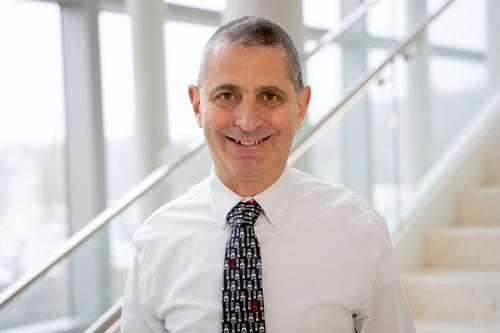Prof. Aroian: Research Sabbatical in Berlin
Until August, Prof. Raffi V. Aroian is spending a research sabbatical with us at the Institute of Parasitology and Tropical Veterinary Medicine
News from May 15, 2024
At the University of Massachusetts Chan Medical School, he conducts research into gastrointestinal nematodes (GIN). He and his team are also working on cures and vaccines against these parasites, such as hookworms (Ancylostoma spp., Necator spp.), roundworms (Ascaris spp.), whipworms (Trichuris spp.) and threadworms (Strongyloides spp.), which can often cause malnutrition, growth disorders and cognitive deficits in people in poorer regions of Africa, among other things. (Further information: https://www.umassmed.edu/aroianlab/)
In Berlin, Prof. Aroian is intensifying his scientific collaboration with Prof. Dr. Georg von Samson-Himmelstjerna, who is also researching parasitic worms with zoonotic infection characteristics in Africa. There are points of overlap, for example, in research into the resistance that these worms develop to medication and in research into appropriate solutions.
Prof. Aroian is accompanied by his wife and two children, who moved with him from Worcester (Massachusetts) to Berlin for a year last summer.
In an interview with Friederike Grasse, Prof. Aroian talks about his research and the differences that he and his family perceive between everyday American and German family life.
Prof. Aroian, why did you decide to spend your sabbatical with us in Berlin?
Georg is in the field of veterinary parasites world-renowned. He’s done a beautiful work, both in characterizing resistance and mechanism of action studies. We began collaborations with various people around Europe and when I was thinking about where would be a good place to put all of this together, where the facilities would be to be able to do these studies with somebody who is obviously very adapt and very knowledgeable, it was here. And it’s worked out fantastic.
What exactly are you researching and working on here?
We work on a new method of deworming, that is based on soil bacteria. It is a soil bacterium that is used all around the world to control insect pests and my laboratory has been working on understanding how this same bacterium can be used to control nematode pests. We discovered that it can do it very well. We have developed a technology to produce this, the active ingredient of the bacterium, which is a protein, to very high productivity and scale in a manner that could be recreated anywhere easily.
I am not teaching here in Berlin, but I still have to run my lab in the United States, to write grants, to write papers – so I’m busy.
You came over with your family as well, so was it easy to convince them to leave Massachusetts?
It is an adventure for them but generally very positive. It has been a challenge for my wife because her business is importing green coffee from Africa and she learned that doing business in Europe is very different than doing business in United States. This has not been easy for her to work, and it takes a lot to learn the system here. But overall I think she likes being in Berlin.
Our twins, 11 years old – were fun, because one of them didn't want to come and one of them was fine with coming. And then, once we got here, they switched. But he is becoming more comfortable being here as well now. And I think overall, they are having a very good experience.
What are the main differences between Worcester and Berlin? What did your family tell you what it was for them?
Certainly, the public transportation here is much better, so we're learning to get around the city with public transportation as opposed to getting a car and going somewhere. That is a big difference. There is also much more within reach here.
In the United States the supermarkets are much bigger, but there is much fewer of them. There is no way from where I live that I can actually walk to the supermarket. I mean, it's physically possible, but it would take me all day just to go shopping. Whereas here and almost no matter where you live, you're not far from a supermarket. Things are more convenient that way. And I can cycle to work and go by bike all around the city because there are bike paths almost everywhere.
Furthermore, the level of independence that the kids have here relative to the United States is very striking.
We find that people are very friendly, very supportive here. So, we've had in general very good experiences with our interactions with people. And it's fun learning German.
Thank you very much for the interview, Prof. Aroian! Good luck with your impressive and helpful research and have a good time for the whole family in Germany.
